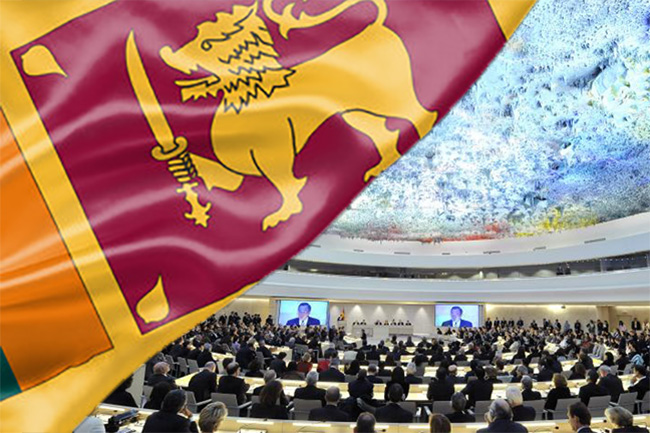Sri Lanka has expressed its willingness to amend the Prevention of Terrorism Act (PTA), a move that analysts and diplomats are calling a bid to evade criticism at the upcoming United Nations human rights session and to prevent the loss of a lucrative European Union trade concession.
The island nation is under pressure to prove its sincerity in addressing alleged past human rights violations and to change the PTA, the country’s four-decades-plus-old anti terror law. Both local and international rights groups have claimed successive governments have used the PTA to muzzle ethnic minorities and political rivals.
The ruling Sri Lanka Podujana Peramuna (SLPP) coalition government’s Foreign Minister G L Peiris tabled the “Prevention of Terrorism Temporary Provision Act of 48 of 1979” in parliament on Thursday as per standard procedure.
The amendment came a day after Foreign Ministry in a joint statement with the EU said the European bloc has noted that “important elements had not been included in the Amendment Bill gazetted”.
“Sri Lanka took note of the views expressed by the EU to take further steps to make the PTA fully compliant with international norms,” the EU-Sri Lanka joint statement said.
“In the interim, while taking note of the administrative steps taken in the form of directives issued by the Inspector General of Police, the EU urged Sri Lanka to continue reducing the use of the PTA, and to undertake further practical and administrative steps to release on bail those detained under the PTA without charges.”
The incumbent government used the PTA to detain Hejaaz Hizbullah, a lawyer who was accused of being linked to the 2019 Easter bombers sans evidence. Hizbullah was released on bail this week after 667 days in detention.
Hejaaz was released two months after the authorities granted bail to Ahnaf Jazeem, a poet who was detained for 19 months over concerns that his poems and teachings had caused ‘communal disharmony’.
The EU and global human rights groups had requested the previous government to repeal the PTA in exchange for continued access to the EU’s Generalized Scheme of Preferences (GSP) plus, a lucrative trade concession annually worth over 500 million US dollars.
GSP+ hanging in balance
The SLPP had earlier resisted reforms to the terror law, but is now forced to amend it after EU has demanded the PTA’s repeal it in return for GSP+, diplomats say. The renewal of the GSP+ is due this year and some diplomats say the EU is likely to be tough on its stance.
Sri Lanka under the previous government had agreed to repeal the PTA in compliance with 27 international conventions related to human rights, labour rights, protection of the environment and good governance covered by the GSP+ scheme.
“Sri Lanka reiterated its commitment to effective implementation of the 27 conventions, and noted its adherence to the principle of non-discrimination, and the removal of any further impediments in the exercise of labour rights and fundamental freedoms,” the joint statement said.
However, international rights groups said Sri Lanka has been targeting people’s basic rights through the PTA.
“Sri Lankan authorities continue to use the Prevention of Terrorism Act to sweep away targeted people’s basic rights, reneging on past government promises to repeal the law,” Meenakshi Ganguly, South Asia director at Human Rights Watch said in a statement this week.
“Proposed government changes to the PTA appear aimed to assuage the concerns of the EU and other governments, without ending abuses.”
Ahead of UN session
The government’s move to table the PTA amendments in parliament also comes just days ahead of the upcoming United Nations Human Rights Council (UNHRC) session where the island nation is likely to be criticised for the various alleged rights abuses under the current government and the continued use of the PTA.
Sri Lanka’s Justice Minister Ali Sabry has said the amendments to the PTA are temporary until the government comes up with an internationally accepted anti-terrorism law.
The Human Rights Watch (HRW) this week said the EU is unlikely to be satisfied with the amendments the government has presented to parliament and that “may mean trouble for the government”.
“The proposed amendments were an attempt to salvage Sri Lanka’s tariff-free access to the EU market under the bloc’s GSP+ trading scheme, which is conditioned on respect for international human rights,’ the HRW said in a statement.
“Some detainees were released or bailed over recent weeks, but many more remain in arbitrary detention, often held for months or years.”
Rights groups have campaigned against the PTA and called for its repeal claiming that its provisions are used for arbitrary detention and torture, particularly targeting minority Tamil and Muslim communities and suppressing civil society.
“The Sri Lankan authorities must ensure that all those still detained under the PTA have access to fair bail hearings and release those who have not been charged with recognisable crimes under international law,” the New York-based Amnesty International said in a statement after Hizbullah’s release.
“They must also repeal the PTA and issue an immediate moratorium on its use, as repeated attempts to amend the law have proved futile.”
In December, UN experts said people apprehended under the PTA continue to remain in arbitrary detention, often held for months or years under its provisions.


